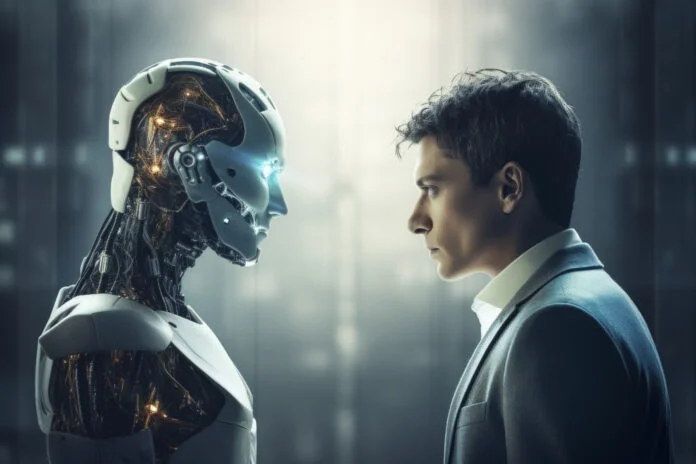Robots and artificial intelligence (AI) might seem like something from a science fiction film, but have you ever questioned if they could take over our lives? AI and robotics are among the booming concepts in today’s digital world.
You’ve probably seen movies where robots turn against humans and try to rule the world. But the truth is, robots and AI are just tools humans create and control. They don’t have thoughts or feelings like we do! Moreover, the idea of them taking over is more like an incredible story than something that might happen.
Robots and AI are already changing the way we live and work. They hold the potential to make a difference in every sector and impact various factors. They can help us with repetitive or dangerous tasks, like assembling cars or exploring outer space. But there also arise numerous questions regarding privacy, fairness, and who gets to control them.
So, can AI actually “take over” humans? The concern remains the same.
In this article, let’s explore this question from different angles: socially, politically, economically, technologically, and ethically. Let’s begin! But first, let us understand what AI is.
What is AI? Explained!
Artificial Intelligence (AI) in simple terms refers to the technology that lets computer systems to perform tasks that are associated with human intelligence. These tasks mainly include, learning, problem-solving, recognizing patterns and making decisions. AI encompasses two broad technologies such as deep learning, machine learning and natural language processing (NLP). AI covers a wide range of applications, from simply creating content to self-generating cars, AI is everywhere.
How Significant is AI’s Impact on Different Factors?
It cannot be denied that AI is undoubtedly a game-changer. However, it’s essential to gauge its impact on the factors given below.
Social: Imagine if AI becomes so advanced that it replaces many jobs currently done by humans. This could lead to people losing their livelihoods and uncertainty about the future. That would be an alarming sign. Additionally, AI could change the way we interact with each other.
For example, suppose we start relying too much on AI for social interactions, like chatting with virtual assistants instead of real people. In that case, we might lose the warmth and connection that make human relationships unique. And after all, Aristotle said, “Man is by nature a social animal.” Overall, the possibility of AI taking over humans is hard to imagine if we look closely at the scenario.
Political: AI is used to manipulate information and influence people’s thoughts or beliefs. This could make it harder for people to make well-informed decisions, especially during crucial events like elections. Government organizations might use AI to control citizens and watch them live, compromising ordinary people’s privacy and rights.
Economical: Small companies are constantly being the victim of massive things. Again, think about the economic impact and how AI could change jobs and industries. While it can help make things faster and more efficient, it might also mean some people lose their jobs. This could be tough for them to find new work and could create a more significant gap between rich and poor. For example, big companies can afford fancy AI technology and gradually shift to the same. However, this can leave smaller businesses struggling and needing help with the same.
Technological: Even though AI is getting smarter, it’s still far from being able to “take over” humans, like in the films. AI is good at specific processes but needs help to think like humans do. It’s a next-level tool that requires humans to tell it what to do.
For example, AI is utilized in a customer service chatbot for an online shopping website. It offers assistance based on programmed algorithms and data. The chatbot can efficiently provide answers and solve simple problems. But it lacks human emotions and experiences. It functions solely as a helpful tool designed to enhance the user experience.
Ethical: One of the most crucial concerns with AI is its capacity to perpetuate biases and discrimination. If AI systems are trained on biased information, they could make unfair decisions that harm particular people. For example, AI used in hiring methods might favor one demographic over another, leading to discrimination.
Summing it Up
Robots and AI can do amazing things, like spotting faces, translating languages and content, creating images, audio, videos, and more. But they’re less smart and adaptable than humans. They can simply do what we tell them to do, and they need our assistance to examine and enhance.
So, the conclusion is that AI can only partially take over humans. They’ll always need them when performing any small to critical task.
Recommended For You:

